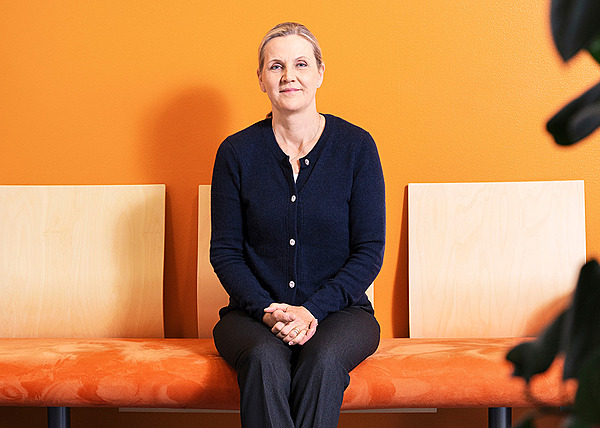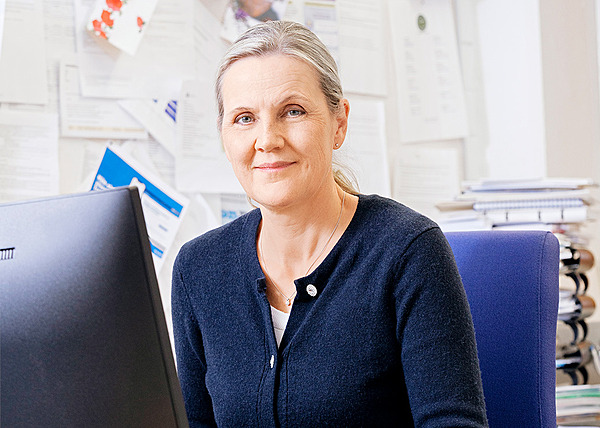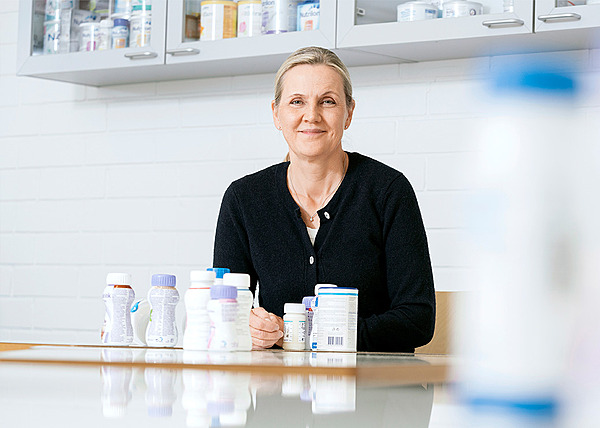
Chasing the secrets of genetics and nutrition
“My work is at its best when I finish a research project, as well as when I notice my students improving while I am teaching”, summarises Professor of Nutrition Therapy Ursula Schwab, the 2024 Professor of the Year.
Text minna hiidensaari images petra tiihonen english translation Marko saajanaho
Strict. That is how Ursula Schwab, Professor of Nutrition Therapy at the University of Eastern Finland and Professor of the Year award recipient, describes herself as a teacher. She has her reasons for this.
“To ensure patients are not treated wrong. We can’t do things half-baked; we must know the proper way.”
In the same breath, Schwab states her students tend to be overly critical towards themselves. Your attitude is important.
“You have to give yourself some slack, enough time to mature. You can see in patient meetings that the student is well prepared even if not everything quite goes to plan. That is when I encourage them and focus on what went well in my feedback. But if the student comes to the situation without preparing, I guide them to review the instructions and materials.”
Research approaches gaining weight
The multiple time award-winning professor’s CV is a breathtaking read. Schwab has published 237 peer-reviewed scientific articles in international publication series, directed international research projects, and worked in countless specialist groups in the field.
In her career spanning three decades, Schwab has mainly researched fat and sugar metabolism in the human body, along with accumulation of fat in the liver and low-grade inflammation in recent years.
“The themes have stayed the same, the approach has just gained weight. For example, the microbes of the large intestine are still not understood very well. However, we know microbes regulate metabolism.”
Schwab has always conducted research with people.
“So-called intervention research. Difficult, expensive, and arduous”, she states.
No teaching without clinical work
Meeting with patients at the Kuopio University Hospital is the cornerstone of Schwab’s work.
“I wouldn’t be able to provide quality teaching without doing clinical work. It is important for my competence to meet patients face-to-face.”
In terms of nutrition science research, we know individual guidance brings results. In addition, tailored nutrition information combined with group-based instruction is effective. Many patients Schwab meets have a serious illness such as cancer, or a difficult neurological condition. Life and death are present in her job.
“However, with people with food allergies and child patients, there is almost always light at the end of the tunnel.”

Clinical work, teaching, research, and administrative work take turns in Schwab’s workday. She only teaches students in the master’s degree stage, pursuing a clinical career.
“This is a good fit for someone like me. I don’t get anxious about work stacking up. I accomplish more with enough challenges and a little bit of pressure. All my work is also interconnected.”
Tone of conversation matters
On the day of the interview in Kuopio, Schwab has biked from work to home, as she tends to do. The route is ten kilometres in each direction.
“Biking is a fantastic way to air out your brain. The route has plenty of hills, so you always get to click on those gears.”
The tea enthusiast is sipping on green tea flavoured with apricot flowers.
“At best – or worst – I’ve had 32 different tea varieties at home.”
“The themes have stayed the same, the approach has just gained weight.”
Ursula Schwab, Professor of the Year 2024
What do the development expenses of Finnish public health look like based on Schwab’s decades-long career?
“The biggest changes include both good and bad. For example, medical treatment of elevated blood pressure, fat metabolism disorders, and diabetes has become more effective. More vegetables and fruit are consumed. On the other hand, child and adolescent obesity has increased, as has working-age obesity. People are not getting enough fiber and good fats from their nutrition.”
And even though people eat fish, recommendations state more could be eaten. Improving the quality of one’s diet is one important method for treating weight gain. What is even more crucial is the tone in which these matters are talked about. The condemnatory tone of the discussion bothers the professor.
“I emphasise to my students as well that the discussion should be encouraging in tone. Guilting causes feelings of powerlessness and lack of belif in one’s success.”
Examples highlighted by the media also matter. A triathlete as a role model may discourage. Schwab wishes people would remember that even a five to ten percent loss of weight is positive for one’s health.
“There is no need to pursue overly massive changes.”
no social media debates
Schwab has strived to make nutritional science issues more accessible to the layperson. Even as a teenager, she thought a researcher should be outgoing.
“We are funded by taxes, so we university people should be available.”
The rapid digitalisation has also brought on changes to university work
“The world has expanded. We can announce things to the wider audience more effectively than before. On the other hand, criticism of researchers and fields on social media platforms is an undesirable change.”

What does the professor of nutrition therapy think when looking at all the various and often dubious nutrition-related content on social media and elsewhere online?
“It does bother me. A lot of it also seems to be driven by financial interests. I don’t like the idea of exploiting people’s health and desperation for profit. That is unfair and inappropriate.”
Sometimes, in her clinical work, Schwab encounters patients who have found erroneous nutrition guidance, leading to health problems. Schwab herself mainly reads scientific publications and focuses on professional work.
“If I decided to dive into social media debates, that would just be a bottomless swamp. My channels of influence are elsewhere.”
”If I decided to dive into social media debates, that would just be a bottomless swamp. My channels of influence are elsewhere.”
Ursula Schwab, Professor of the Year 2024
Schwab is frequently interviewed for magazines, and she enjoys giving lectures to audiences.
“It is nice when people ask questions during the lectures and I’m able to correct potential misconceptions by responding with careful arguments.”
Supporters encouraging to go forward
Nutrition science is a dream career for many. At best, there were nearly a thousand applicants per year. Since then, that number has stabilised in the 400–500 range. Some have applied up to seven times to study the field, which exploded in popularity when nutrition therapist Hanna Partanen gained fame through the Finnish edition of the You Are What You Eat TV programme. Years ago, Schwab was Partanen’s advisor on her master’s thesis.
“It’s important for us to be able to provide the best possible starting point for our students.”
One of Schwab’s own key experiences also has to do with the importance of a good starting point to your career.
”It’s important for us to be able to provide the best possible starting point for our students.”
Ursula Schwab, Professor of the Year 2024
“I’ve happened across some great people along the way.”
Schwab’s own path to a career as a nutrition scientist opened through Elisa Holma, the sharp-eyed guidance councilor at the Jyväskylä Lyseo Upper Secondary School.
“Holma asked everyone in for a one-on-one chat. I told her I had been thinking of becoming a doctor, but that wouldn’t be possible because I couldn’t fit physics in my curriculum. I was leaning towards becoming a nurse instead. Holma said I had to go to university and asked what else I was interested in.”
Schwab, who studied advanced biology and chemistry, replied that she was interested in food and nutrition. At that moment, Holma thought to pull out a University of Kuopio brochure describing their recently introduced nutrition science programme. The year was 1984.
“That became the only option I would consider. I wish all upper secondary school kids had an Elisa Holma that can guide you to your dream career.”
”I noticed teaching was quite fun, albeit rather time-consuming.”
Ursula Schwab, Professor of the Year 2024
Schwab also thanks her professors – Matti Uusitupa and Hannu Mykkänen – for their encouragement.
“Both always had time for me. I’ve tried to apply that experience with my own students.”
Schwab was working as a researcher in Boston when Uusitupa informed her of a vacant assistantship and urged her to apply.
“I would make excuses, saying I didn’t know how to teach.”
In the end, Schwab did apply for the position and got it.
”Administrative work has helped broaden my horizons about university operations.”
Ursula Schwab, Professor of the Year 2024
“I noticed teaching was quite fun, albeit rather time-consuming.”
Now, Schwab suspects she might have become bored of working exclusively as a researcher had she not applied for the teaching job.
Administrative work also became part of her career through some external encouragement.
“My supervisor at the time, Jussi Pihlajamäki, insisted ‘Ursula, you have to go to management training now.’ I could not understand why.”
The importance became clear through her later work.
“Administrative work has helped broaden my horizons about university operations.”
Cross between nutrition and genetics
In what moments does Schwab enjoy her work the most?
“When I finish a research project. And when I see my students improve.”
Recently at the Kuopio University Hospital, Schwab encountered a recent graduate working as a substitute teacher. They would sigh and say how they wish they could attend Schwab’s lectures again.
“There has to be something good about my teaching”, Schwab humbly reckons.
Another highlight of the job is her patients’ interest in matters of nutrition and their gratitude.
”Many are grateful to receive the latest research information and be involved in choosing ways to affect their health.”
Ursula Schwab, Professor of the Year 2024
“Many are grateful to receive the latest research information and be involved in choosing ways to affect their health.”
The most difficult part of Schwab’s career was when an external decision forced the curriculum to be partially reorganised. This arrangement increased the workload of the staff.
“That change had to be pushed through despite the fact I was not involved in the administrative decision and did not support it.”
A phrase Schwab saw in an article by Yle around that time helped her process the situation.
“The text said every problem must have a head and a body.”
”People are doing a lot of extra work to make sure the students are taught well.”
Ursula Schwab, Professor of the Year 2024
In difficult moments, people need someone to take their objections and displeasure out on.
Schwab thinks the university has plenty of room for improvement. One of the most essential issues is ensuring sufficient resources to allow teachers to complete their job tasks during their working hours.
“People are doing a lot of extra work to make sure the students are taught well. The universities and the Ministry of Education and Culture shouldn’t rely on people continuing to do as much extra work as they are doing now.”
Despite the diversification of funding opportunities, the lack of research funding eats at the field.
“Such scant research funding is downright embarrassing. If a talented new graduate is interested in doing science, you should be able to support that.”
Ursula Schwab, Professor of the Year 2024
”Some genetic functions can be stimulated through lifestyle changes and others can be suppressed.”
Schwab herself plans to conduct more research on the role of genetics in effective lifestyle changes
“Some genetic functions can be stimulated through lifestyle changes and others can be suppressed.”
Schwab is fascinated by the possibility that, for example, a patient suffering from high cholesterol could be given specific instructions for improving their health through nutrition.
To balance out her research work, Schwab describes doing gardening as a form of self-therapy. On the plot in her yeard and its vicinity, she grows zucchini, tomatoes, potatoes, wax beans, various lettuces, and salsify.
“In research, things happen slowly. You see results much quicker in gardening.”
Ursula Schwab, Professor of Nutrition Therapy, University of Eastern Finland
Professor of the Year 2024: Professor Ursula Schwab’s field requires cooperation in challenging test scenarios between different parties. Bringing forth results and interpreting them is the result of years of patient work. In her field, Schwab is a trailblazer able to transform research results into practical applications.
Work: Professor of Nutrition Therapy at the University of Eastern Finland since 206. Also works at the Kuopio University Hospital.
Family: Spouse, two adult children
Hobbies: Gardening; cooking, especially trying new recipes; skiing; building large jigsaw puzzles; music. “When I was young, I played the clarinet. I first focus on the clarinet players at concerts.”
What are you known for in your work community? According to my colleagues: efficiency; time management skills; extensive knowledge of nutritional science; defending labour rights; and being accessible. “Anyone can ask you anything at any point.”
What are you not known for? Following football since I was a little girl. I especially remember the Argentina–Netherlands match from 1978, which ended 3–1. “As my father advised, I follow sports to enjoy the best performances, no matter who is performing.”